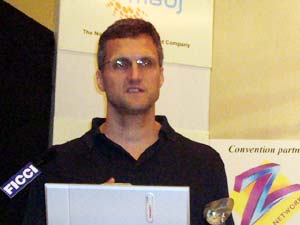Following the co production in animation session was the session on Project and Schedule management n animation & gaming.The speakers for the session were Christopher Thomson from EA, Deepak Ail from Indiagames and Anumukonda Ramesh from IBM. The session was moderated by Ashish Kulkarni.

One of the most effective and enriching sessions of the day was the one by Christopher Thomson from Electronic Arts. Entitled ‘Taming the beast’ the visually rich presentation took the audience through the pre pro techniques employed by EA.
” In a scenario where 30 to 50% of development resources are wasted, managing schedules becomes critical to success.” said Christopher.
Elements of EA pre pro
Certain processes and points are enlisted below
– Time Boxing
(Excercises of 15-20 minutes each- helps creative teams make decisions quickly
-Great games come from great teams
(Trust, respect, accountability)
-Frame work
(What are they going to deliver
When are they going to complete)
-Creative process – iterative , messy. unpredictable
-Rapid early iteration – (Mistakes and changes are part of the game. however the earlier in the curve that you make the changes, the better)
-Rapid Prototyping (Fast, Cheap, Public, Physical)
-Building physical models complete with characters, terrain and environment help give the artists a feel and look.
-Effective brainstorming
-Mind mapping
-Outline for Ripomatic (Helps identify the style and the emotional world )
– Planning on the real issues (What risks do we face?)
– Talking about real risks
– Communicating (Are the teams talking to each other)
The product of this excercise is less important than the process of doing it.
– Cost / Benefit Analysis
How do we know it works
Ships on time
A critical and commercial success
Team is healthy at the end of the project.
The next 2 speakers A Ramesh from IBM and Deepak Ail from Indiagames spoke about various things like ERP and other process and scheule management techniques that were common to both software as well as animation.
“The way we have grown over the past 2 years is due to certain systems that we set up when we were small” remarked Deepak in his very short presentation.
Next on, Ashish Kulkarni then spoke about the things needed to survive in this field,” Never start a project until it is greenlit and fully funded” said Kulkarni.
In the group talk that followed, Kulkarni’s poser to the panelists was if they had any specific information on Completion Guarantee Companies. The group also discussed Change Control methods and how changes in game design early on could add to creativity but changes later on meant extra time and costs.
“Get your game ready to a workable, playable version as soon as possible. Try looking at a prototype as early as possible” remarked Christopher at the end of the session.
